鲁教版(五四制)七年级上册Unit 4 What did you do last weekend SectionB课件(共35张PPT)
文档属性
| 名称 | 鲁教版(五四制)七年级上册Unit 4 What did you do last weekend SectionB课件(共35张PPT) |
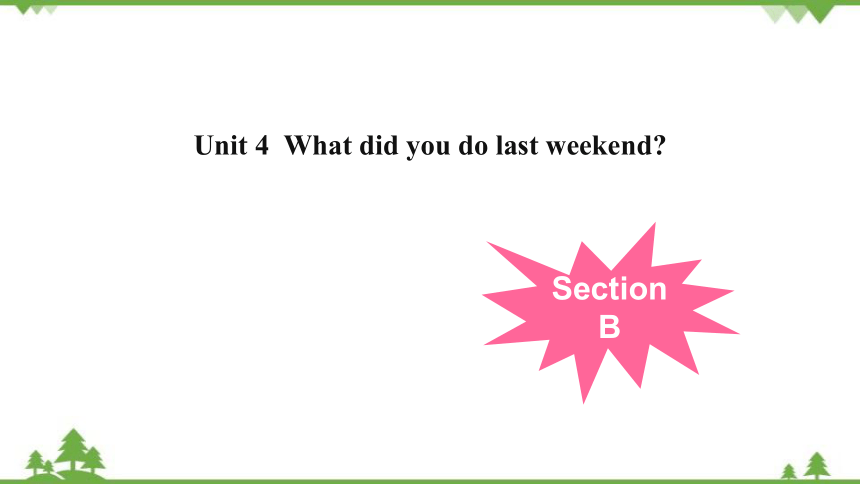
|
|
| 格式 | ppt | ||
| 文件大小 | 2.3MB | ||
| 资源类型 | 教案 | ||
| 版本资源 | 鲁教版 | ||
| 科目 | 英语 | ||
| 更新时间 | 2022-10-22 00:00:00 | ||
图片预览

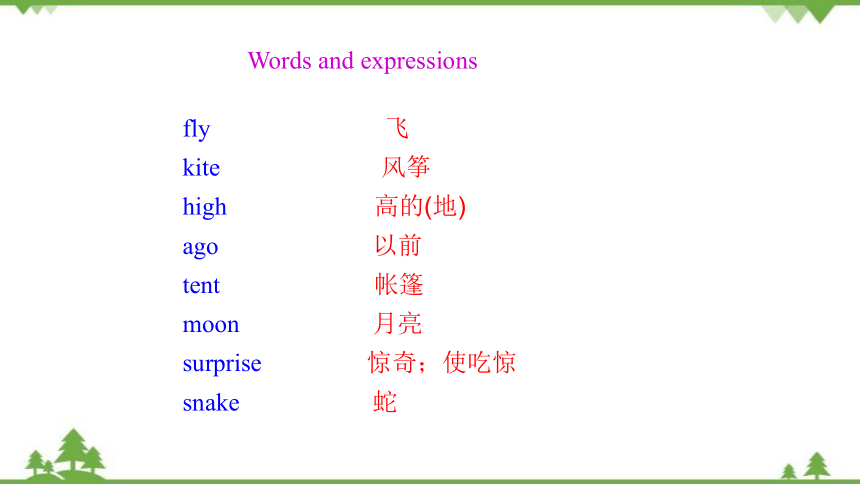
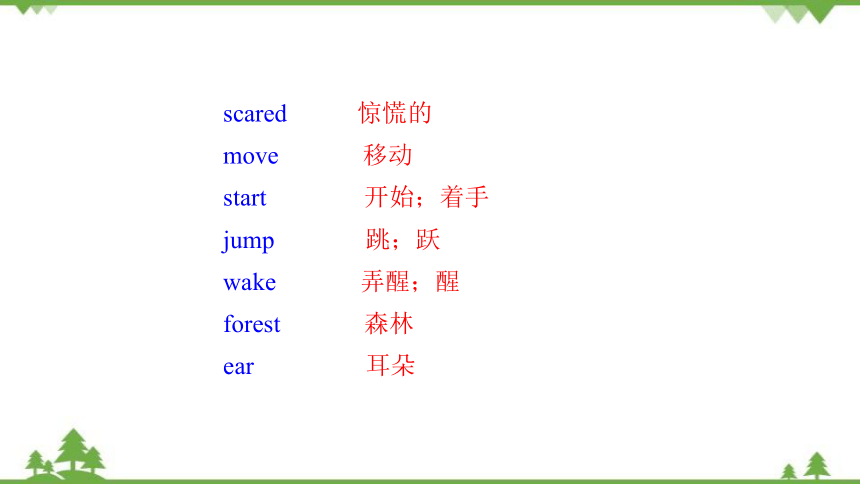
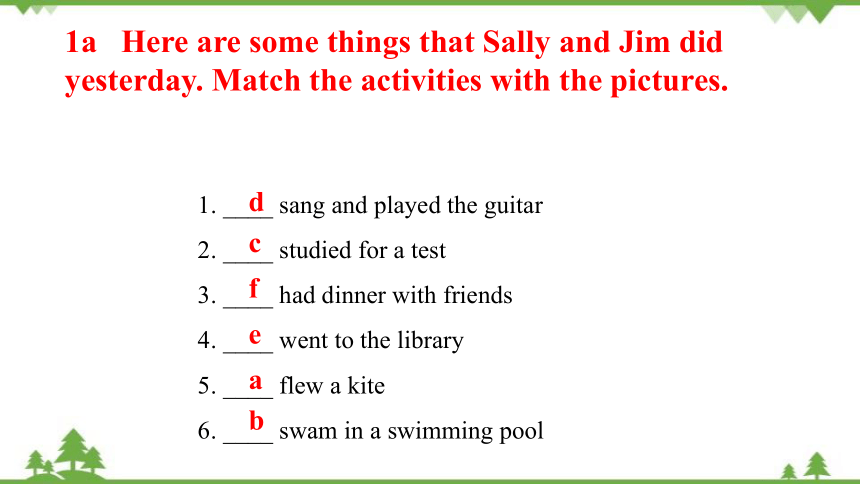
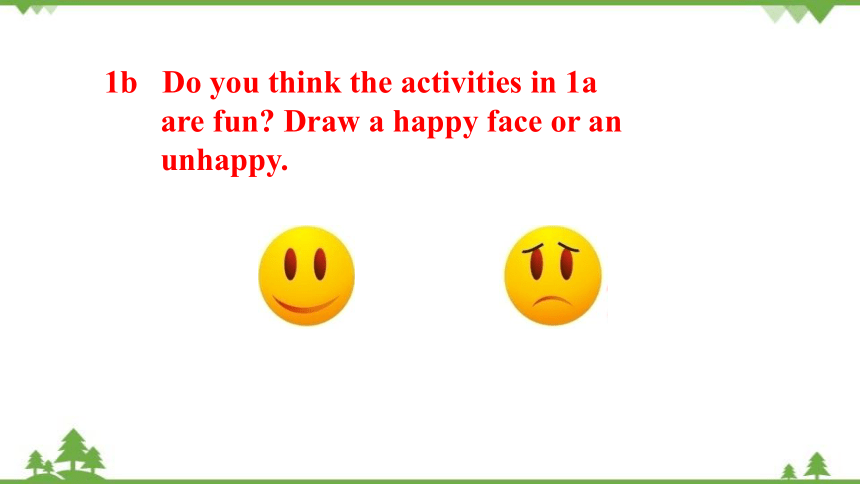
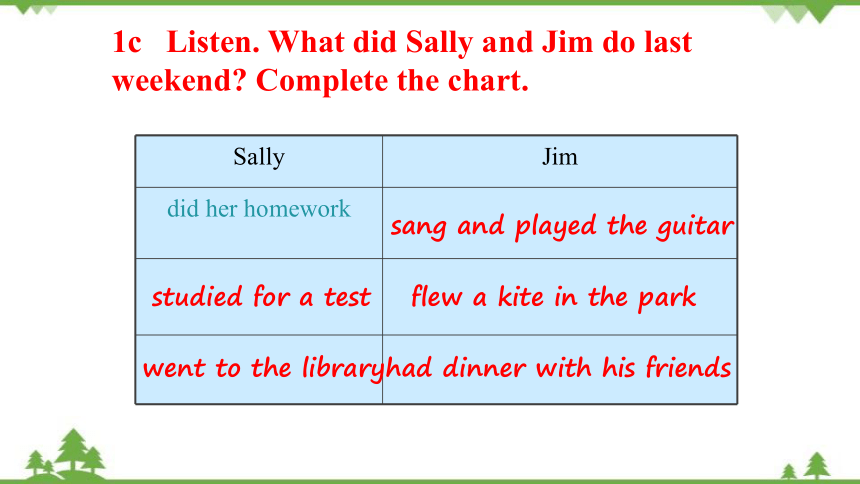
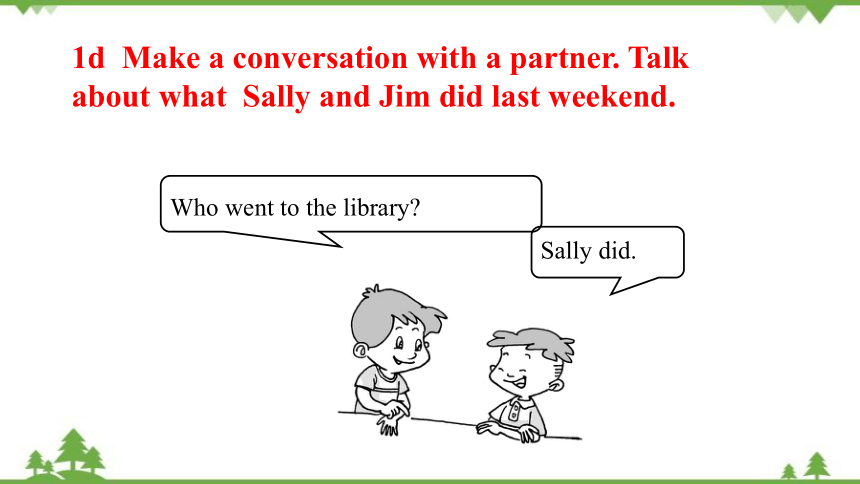
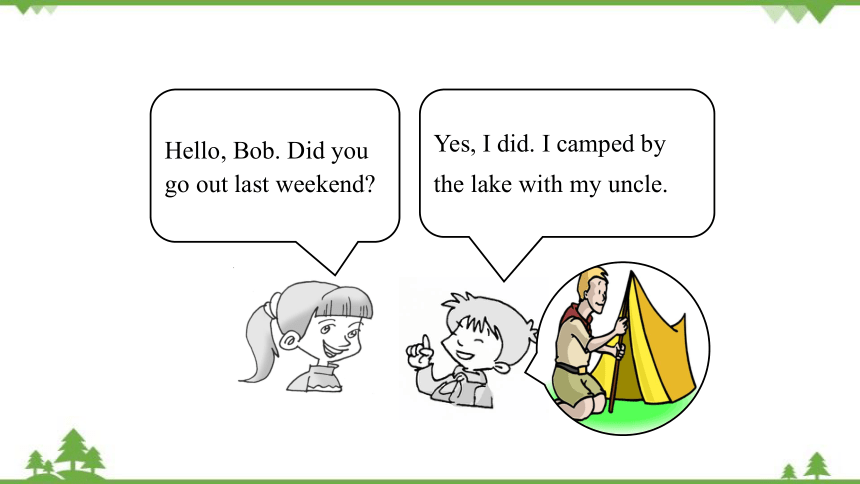
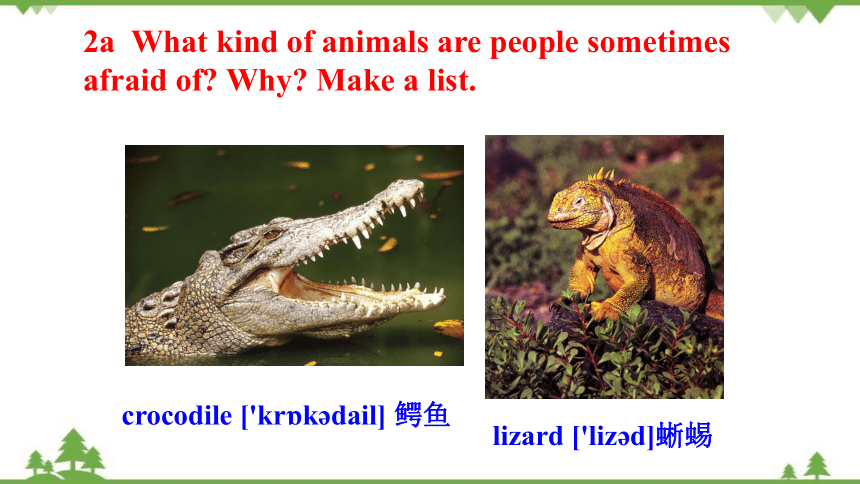
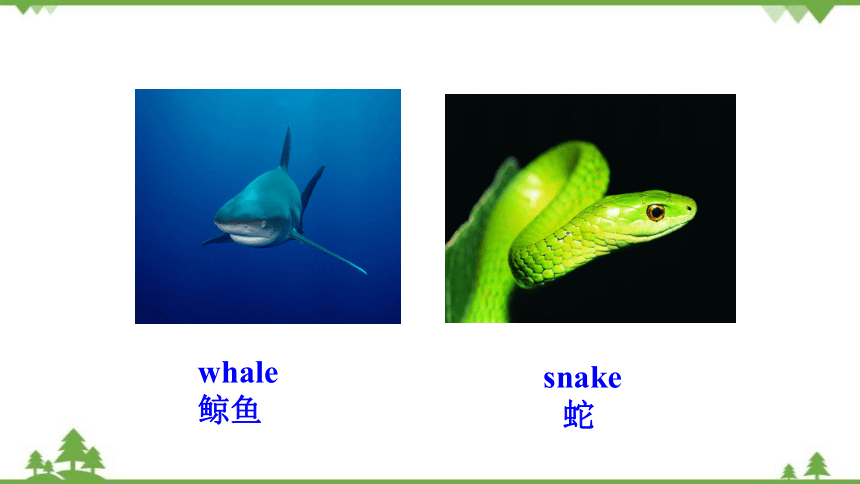
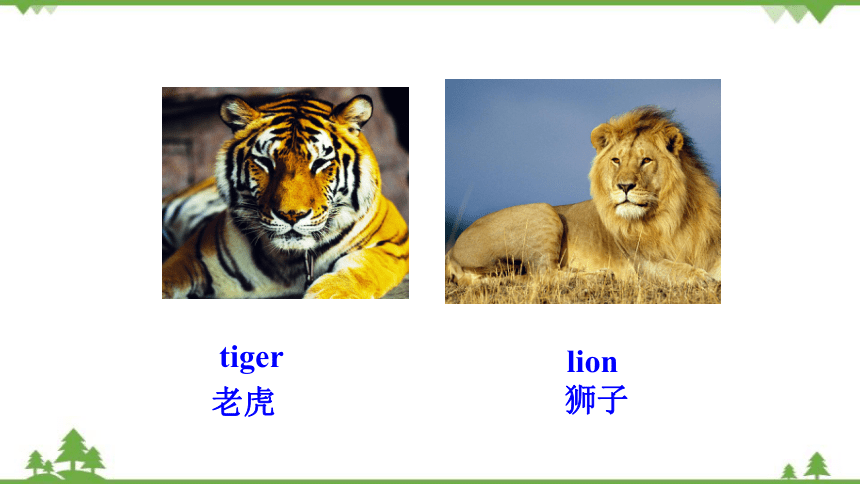
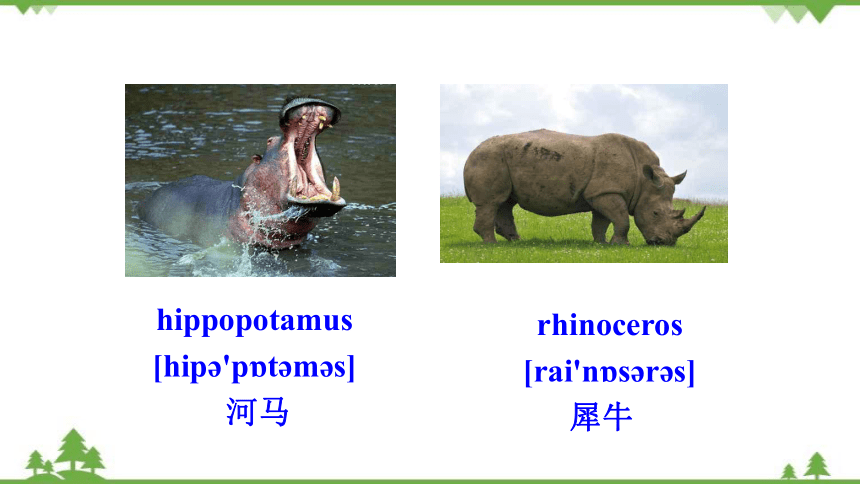
文档简介
(共35张PPT)
Unit 4 What did you do last weekend
Section B
Words and expressions
fly 飞
kite 风筝
high 高的(地)
ago 以前
tent 帐篷
moon 月亮
surprise 惊奇;使吃惊
snake 蛇
scared 惊慌的
move 移动
start 开始;着手
jump 跳;跃
wake 弄醒;醒
forest 森林
ear 耳朵
1a Here are some things that Sally and Jim did yesterday. Match the activities with the pictures.
1. ____ sang and played the guitar
2. ____ studied for a test
3. ____ had dinner with friends
4. ____ went to the library
5. ____ flew a kite
6. ____ swam in a swimming pool
d
c
f
e
a
b
1b Do you think the activities in 1a
are fun Draw a happy face or an
unhappy.
Sally Jim
did her homework
1c Listen. What did Sally and Jim do last weekend Complete the chart.
studied for a test
went to the library
sang and played the guitar
flew a kite in the park
had dinner with his friends
Who went to the library
Sally did.
1d Make a conversation with a partner. Talk about what Sally and Jim did last weekend.
Hello, Bob. Did you go out last weekend
Yes, I did. I camped by the lake with my uncle.
2a What kind of animals are people sometimes afraid of Why Make a list.
crocodile ['kr k dail] 鳄鱼
lizard ['liz d]蜥蜴
whale
鲸鱼
snake
蛇
tiger
老虎
lion
狮子
hippopotamus
[hip 'p t m s]
河马
rhinoceros
[rai'n s r s]
犀牛
How was Lisa’s weekend
2. Where did Lisa and her family go last weekend
3. How did Lisa feel when she saw the snake
It was interesting but scary.
They went to a small village in India.
She was so scared that she couldn’t move.
2b Read about Lisa’s weekend and answer the questions.
4. What did Lisa and her sister do
5. What did their parents do Why did they do that
6. What lesson did Lisa learn from the weekend
They shouted to their parents.
Her father jumped up and down to scare the snake.
Don’t go near snakes./ Snakes can’t hear but they can feel movements.
2d Put the phrases in order according to the passage. Then use them to retell the story.
____ snake went into the forest
____ put up our tests and cooked food
____ learned a useful lesson
6
2
8
____ saw a snake and shouted to parents for help
____ snakes can’t hear but can feel things moving
____ my dad jumped up and down in his tent
____ took a bus to a small village in India
____ told stories under the moon, then went to sleep
1
3
4
5
7
I had a busy weekend. On Saturday morning, I . In the afternoon, I . It was a little difficult. On Saturday night, I stayed at home and _______________ cook dinner.
On Sunday morning, I ________________. I read a book about history. Then in the afternoon, I ___________ with my friends. On Sunday night, I . I saw an interesting talk show.
cleaned my room
did my homework
helped my mom
went to the library
played soccer
watched TV
3a Look at the pictures and complete the passage.
Self Check
1 Complete the phrases.
______ out with friends
______ for a walk
______ apples
______ photos fly a __________
milk a _________
camp _________
the lake
study _________ a test
go
go
eat
take
kite
cow
by
for
2 Complete the conversation.
A: I had a school trip last week.
B: Really. _____________________ (go)
A: I visited the fire station.
B: ___________________________ (go with)
A: I went with my classmates.
B: ___________________________ (do)
A: We watched the firefighters work. What an interesting job they have!
B: ___________________________ (learn anything)
A: Sure. We learned how to call the fire station and what to do when there is a fire.
Where did you go
Who did you go with
What did you do
Did you learn anything
As a special gift, our parents took us to India.
作为一份特殊的礼物, 我爸妈带着我们去了印度。
1) 此处介词as 表示“作为……; 当作……”,其后可以接职业,用途,特点等。用在句首时,这种短语的后面往往有逗号与语句的主体隔开。
eg:As a student, I must work hard.
作为一名学生,我必须努力学习。
Language Points
2) 本句中动词take 表示“带领”,take … to …则表示“带领某人去某处”。
eg:On Sundays, the father would take his son to the park.
一到星期天,爸爸便会带他的儿子去公园。
辨析: bring, take, carry, fetch
bring 意为“拿来,带来”,表示“拿到靠说话人近的地方”。
take 意为“拿走,带走”,表示“拿到远离说话人远的地方”。
carry 意为“扛,搬”,用力移动,没有方向性。
fetch 意为“去取,去拿”表示往返拿物。
练习
The Young Pioneer ______ water for the old man every day. A. fetches B. brings C. takes D. carries
D
2. There we put up tents and made a fire to keep us warm and cook food on.
在那里我们架起帐篷,生火取暖并做饭。
1) 动宾短语表达法:put up tents 搭建帐篷; make a fire 生火;keep us warm 使得我们暖和;cook food on the fire 在火上做饭
2) 本句的主体部分是we put up tents and made a fire, 后续的 to keep us warm and cook food on (it) 表达的是made a fire 的目的。句尾介词“on” 后有所省略,以避免重复。
3. On the first night, … 在头一天夜里,……
英语中表示一天中的时间分别采用at night (在夜里)、in the morning (在上午)、in the evening (在晚上)等,但表示“在某一天上午、下午或晚上等”的特定时间,往往使用介词on。
eg:On the early morning of November 20th, we got a special postcard.
在11月20号一大清早,我们收到了一张特殊的 明信片。
4. But I was so tired that I went to sleep early. 但是我太累了,所以早早就睡着了。
I was so scared that I couldn’t move.
我是那么害怕,一动都不敢动。
英语中 “so +形容词+that 句子”,表示“太……以至于……”。
eg:The game is so interesting that I don’t want to stop playing it.
这个游戏是如此有意思,以至于我都不想停下来。
The soup was so delicious that he drank it up.
汤是那么好喝,于是他喝了个精光。
辨析 so that / so… that
so that引导目的状语从句时,表示“以便;为了”。
eg:I got up early so that I could catch the early bus.
我早起是为了搭乘早班车。
2) so +形容词或副词+ that ...引导结果状语从句,意思是“如此……以致于……”。
eg:He runs so fast that nobody can catch up with him.
他跑得非常快,没人能追上他。
练习
She bought a digital camera online ______ she would save a lot of time.
A. so that B. as soon as
C. no matter D. such that
A
5. … we saw a big snake sleeping near the fire.
我们看见一条大蛇正在篝火附近睡觉。
My dad told me later that snakes … can feel things moving.
后来我爸告诉我蛇……能够感觉到东西的震动。
英语中表示感官的动词,例如see, hear, feel 等动词后可以接动词-ing 短语,表示“看见、听到、觉得某人或物在做……(某事)”。
eg:I can hear the children singing in the classroom.
我能听见孩子们在教室里唱歌。
练习
1.When I passed the classroom, I heard a girl ______ in it.
A. sing B. losing C. sang D. singing
2.—Is Tom in the next room
—Well, it’s hard to say. But I heard him ____
loudly when I passed by just now.
A. speak B. to speak
C. spoken D. speaking
D
D
I.用所给动词的适当形式填空
We ______ (live) in Japan last year.
Jack________ (stop) the car last Sunday.
Tom ______(clean) my room and ______(study)
for the Chinese test last weekend.
4.What ______ you ______(do) last night
5.Last Sunday morning I _____ (play) tennis.
lived
stopped
cleaned
studied
did
do
played
Exercises
Ⅱ.句型转换
1. Tom listened to CDs yesterday.(变否定句)
Tom ______ ______ to CDs yesterday.
2. Father slept all day last Monday.
(改一般疑问句)
______ father ______ all day last Monday
3. I was very busy last week.
(改否定句和一般疑问句)
I _______ very busy last week.
_______ you very busy last week
didn’t listen
Did
sleep
wasn’t
Were
Ⅲ. 翻译下列句子
1. 他昨天晚上为语文考试而学习。
He _______ for Chinese ____ ____ ______.
2. 她假期去看她叔叔了。
She _______ her uncle _____ her vacation.
3. 他没有钱也没有家人。他不想做任何事。
He _____ ____ money and ____ family.
He doesn't want to do __________.
studied
test last night
visited
on
has no
no
anything
Homework
Write about what you did last weekend.
Unit 4 What did you do last weekend
Section B
Words and expressions
fly 飞
kite 风筝
high 高的(地)
ago 以前
tent 帐篷
moon 月亮
surprise 惊奇;使吃惊
snake 蛇
scared 惊慌的
move 移动
start 开始;着手
jump 跳;跃
wake 弄醒;醒
forest 森林
ear 耳朵
1a Here are some things that Sally and Jim did yesterday. Match the activities with the pictures.
1. ____ sang and played the guitar
2. ____ studied for a test
3. ____ had dinner with friends
4. ____ went to the library
5. ____ flew a kite
6. ____ swam in a swimming pool
d
c
f
e
a
b
1b Do you think the activities in 1a
are fun Draw a happy face or an
unhappy.
Sally Jim
did her homework
1c Listen. What did Sally and Jim do last weekend Complete the chart.
studied for a test
went to the library
sang and played the guitar
flew a kite in the park
had dinner with his friends
Who went to the library
Sally did.
1d Make a conversation with a partner. Talk about what Sally and Jim did last weekend.
Hello, Bob. Did you go out last weekend
Yes, I did. I camped by the lake with my uncle.
2a What kind of animals are people sometimes afraid of Why Make a list.
crocodile ['kr k dail] 鳄鱼
lizard ['liz d]蜥蜴
whale
鲸鱼
snake
蛇
tiger
老虎
lion
狮子
hippopotamus
[hip 'p t m s]
河马
rhinoceros
[rai'n s r s]
犀牛
How was Lisa’s weekend
2. Where did Lisa and her family go last weekend
3. How did Lisa feel when she saw the snake
It was interesting but scary.
They went to a small village in India.
She was so scared that she couldn’t move.
2b Read about Lisa’s weekend and answer the questions.
4. What did Lisa and her sister do
5. What did their parents do Why did they do that
6. What lesson did Lisa learn from the weekend
They shouted to their parents.
Her father jumped up and down to scare the snake.
Don’t go near snakes./ Snakes can’t hear but they can feel movements.
2d Put the phrases in order according to the passage. Then use them to retell the story.
____ snake went into the forest
____ put up our tests and cooked food
____ learned a useful lesson
6
2
8
____ saw a snake and shouted to parents for help
____ snakes can’t hear but can feel things moving
____ my dad jumped up and down in his tent
____ took a bus to a small village in India
____ told stories under the moon, then went to sleep
1
3
4
5
7
I had a busy weekend. On Saturday morning, I . In the afternoon, I . It was a little difficult. On Saturday night, I stayed at home and _______________ cook dinner.
On Sunday morning, I ________________. I read a book about history. Then in the afternoon, I ___________ with my friends. On Sunday night, I . I saw an interesting talk show.
cleaned my room
did my homework
helped my mom
went to the library
played soccer
watched TV
3a Look at the pictures and complete the passage.
Self Check
1 Complete the phrases.
______ out with friends
______ for a walk
______ apples
______ photos fly a __________
milk a _________
camp _________
the lake
study _________ a test
go
go
eat
take
kite
cow
by
for
2 Complete the conversation.
A: I had a school trip last week.
B: Really. _____________________ (go)
A: I visited the fire station.
B: ___________________________ (go with)
A: I went with my classmates.
B: ___________________________ (do)
A: We watched the firefighters work. What an interesting job they have!
B: ___________________________ (learn anything)
A: Sure. We learned how to call the fire station and what to do when there is a fire.
Where did you go
Who did you go with
What did you do
Did you learn anything
As a special gift, our parents took us to India.
作为一份特殊的礼物, 我爸妈带着我们去了印度。
1) 此处介词as 表示“作为……; 当作……”,其后可以接职业,用途,特点等。用在句首时,这种短语的后面往往有逗号与语句的主体隔开。
eg:As a student, I must work hard.
作为一名学生,我必须努力学习。
Language Points
2) 本句中动词take 表示“带领”,take … to …则表示“带领某人去某处”。
eg:On Sundays, the father would take his son to the park.
一到星期天,爸爸便会带他的儿子去公园。
辨析: bring, take, carry, fetch
bring 意为“拿来,带来”,表示“拿到靠说话人近的地方”。
take 意为“拿走,带走”,表示“拿到远离说话人远的地方”。
carry 意为“扛,搬”,用力移动,没有方向性。
fetch 意为“去取,去拿”表示往返拿物。
练习
The Young Pioneer ______ water for the old man every day. A. fetches B. brings C. takes D. carries
D
2. There we put up tents and made a fire to keep us warm and cook food on.
在那里我们架起帐篷,生火取暖并做饭。
1) 动宾短语表达法:put up tents 搭建帐篷; make a fire 生火;keep us warm 使得我们暖和;cook food on the fire 在火上做饭
2) 本句的主体部分是we put up tents and made a fire, 后续的 to keep us warm and cook food on (it) 表达的是made a fire 的目的。句尾介词“on” 后有所省略,以避免重复。
3. On the first night, … 在头一天夜里,……
英语中表示一天中的时间分别采用at night (在夜里)、in the morning (在上午)、in the evening (在晚上)等,但表示“在某一天上午、下午或晚上等”的特定时间,往往使用介词on。
eg:On the early morning of November 20th, we got a special postcard.
在11月20号一大清早,我们收到了一张特殊的 明信片。
4. But I was so tired that I went to sleep early. 但是我太累了,所以早早就睡着了。
I was so scared that I couldn’t move.
我是那么害怕,一动都不敢动。
英语中 “so +形容词+that 句子”,表示“太……以至于……”。
eg:The game is so interesting that I don’t want to stop playing it.
这个游戏是如此有意思,以至于我都不想停下来。
The soup was so delicious that he drank it up.
汤是那么好喝,于是他喝了个精光。
辨析 so that / so… that
so that引导目的状语从句时,表示“以便;为了”。
eg:I got up early so that I could catch the early bus.
我早起是为了搭乘早班车。
2) so +形容词或副词+ that ...引导结果状语从句,意思是“如此……以致于……”。
eg:He runs so fast that nobody can catch up with him.
他跑得非常快,没人能追上他。
练习
She bought a digital camera online ______ she would save a lot of time.
A. so that B. as soon as
C. no matter D. such that
A
5. … we saw a big snake sleeping near the fire.
我们看见一条大蛇正在篝火附近睡觉。
My dad told me later that snakes … can feel things moving.
后来我爸告诉我蛇……能够感觉到东西的震动。
英语中表示感官的动词,例如see, hear, feel 等动词后可以接动词-ing 短语,表示“看见、听到、觉得某人或物在做……(某事)”。
eg:I can hear the children singing in the classroom.
我能听见孩子们在教室里唱歌。
练习
1.When I passed the classroom, I heard a girl ______ in it.
A. sing B. losing C. sang D. singing
2.—Is Tom in the next room
—Well, it’s hard to say. But I heard him ____
loudly when I passed by just now.
A. speak B. to speak
C. spoken D. speaking
D
D
I.用所给动词的适当形式填空
We ______ (live) in Japan last year.
Jack________ (stop) the car last Sunday.
Tom ______(clean) my room and ______(study)
for the Chinese test last weekend.
4.What ______ you ______(do) last night
5.Last Sunday morning I _____ (play) tennis.
lived
stopped
cleaned
studied
did
do
played
Exercises
Ⅱ.句型转换
1. Tom listened to CDs yesterday.(变否定句)
Tom ______ ______ to CDs yesterday.
2. Father slept all day last Monday.
(改一般疑问句)
______ father ______ all day last Monday
3. I was very busy last week.
(改否定句和一般疑问句)
I _______ very busy last week.
_______ you very busy last week
didn’t listen
Did
sleep
wasn’t
Were
Ⅲ. 翻译下列句子
1. 他昨天晚上为语文考试而学习。
He _______ for Chinese ____ ____ ______.
2. 她假期去看她叔叔了。
She _______ her uncle _____ her vacation.
3. 他没有钱也没有家人。他不想做任何事。
He _____ ____ money and ____ family.
He doesn't want to do __________.
studied
test last night
visited
on
has no
no
anything
Homework
Write about what you did last weekend.
同课章节目录
- Unit 1 What does he look like?
- Section A
- Section B
- Unit 2 I'd like some noodles.
- Section A
- Section B
- Unit 3 How was your school trip?
- Section A
- Section B
- Unit 4 What did you do last weekend?
- Section A
- Section B
- Unit 5 Where did you go on vacation?
- Section A
- Section B
- Unit 6 How often do you exercise?
- Section A
- Section B
- Unit 7 I'm more outgoing than my sister.
- Section A
- Section B
- Unit 8 What's the best movie theater?
- Section A
- Section B
